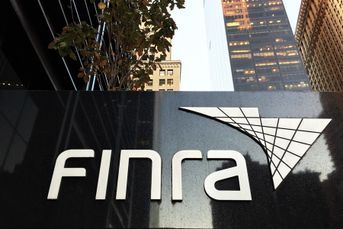‘Wall Street’ sequel taps brokerage executive to bring ’80s back to life
The door from the trading floor to the chief executive's office opens, and before it can close, the voice of a broker working the phones is heard, using a line that could have been lifted from the Shearson Lehman playbook of the go-go 1980s.
The door from the trading floor to the chief executive’s office opens, and before it can close, the voice of a broker working the phones is heard, using a line that could have been lifted from the Shearson Lehman playbook of the go-go 1980s.
“Just work with me today on something small, 500 shares,” the broker implores, and then the door slams shut.
Into the room steps Anastasios “Tommy” Belesis, the chief executive and owner of John Thomas Financial, a fast-growing, hard-charging independent broker-dealer whose more than 200 brokers focus on raising cash for startups and private deals of varying pedigrees.
That day last week, Mr. Belesis, in a snug blue pinstriped suit, matching vest and pastel-blue tie, looked as though he just stepped out of Central Casting for a film about the hustling culture of Wall Street.
There is good reason. Mr. Belesis plays the role of Shia LaBeouf’s investment banker boss in “Wall Street: Money Never Sleeps.” He also worked as an adviser to director Oliver Stone in order to make the sequel film authentic.
The original “Wall Street,” made in 1987, is best remembered for Michael Douglas as Gordon Gekko, uttering the memorable line, “Greed, for lack of a better word, is good.”
Scouting characters and locations for the movie last summer, Mr. Stone found an anachronism in John Thomas Financial. “He couldn’t believe what we had here still existed,” said the 35-year-old Mr. Belesis.
“They’re cold-calling, they’re prospecting. They’re traders,” he said of his brokers. And their behavior is on the up and up, he claimed. “No one trades for their own account here, and we don’t make any markets. We have no affiliations or any conflicts of interest with the companies we recommend.”
Clearly, in an era when the securities industry stresses the value of its financial advice, and firms boast of their certified financial planners, John Thomas is a throwback.
The firm’s trading floor features rows of sharply dressed brokers working the phones to sell an inventory of stocks the house has underwritten or recommends. A Red Bull-only soda machine dispenses pep in a can to keep reps going.
Despite his flirtation with Hollywood, Mr. Belesis’ ambitions have always centered on Wall Street. He opened John Thomas, which is named after his grandfathers, in January 2007 with four employees. He now has 43,000 square feet of office space. His corner office looks down on the New York Stock Exchange.
“Tommy sat in my office three years ago and said, “Hey, I want to be the next Bear Stearns,’” said Ken Norensberg, a compliance consultant who was recently elected as a dissident candidate to the Financial Industry Regulatory Authority Inc.’s board of governors.
Mr. Norensberg hastily explained that Mr. Belesis’ ideal was Bear Stearns before it collapsed in March 2008 — a firm that he felt stood for quality in investment banking and retail brokerage.
John Thomas has the potential to be the next “superfirm,” Mr. Norensberg said, noting that Mr. Belesis does whatever it takes to fuel growth, “even if it means spending half a million dollars” on compliance. Mr. Norensberg serves as a consultant to the firm.
A broker-dealer’s rapid growth can draw the attention of regulators, say industry executives and attorneys, noting that small and midsize broker-dealers live in fear of being fined or shut down by the Securities and Exchange Commission or Finra for rule violations.
And Mr. Belesis’ track record in the industry has scuff marks.
S.W. Bach & Co. fired him in 2005 due to an “inaccurate representation of identity to customer,” according to Mr. Belesis’ record on Finra’s BrokerCheck system. A client sued him and a prior firm for $750,000 in 2001 for churning, and a Finra arbitration panel later awarded the client $259,000. Mr. Belesis and past firms have settled two other Finra arbitration claims totaling nearly $100,000, Finra records show. He paid $46,000 as his share of the settlements.
Mr. Belesis brushes aside the S.W. Bach firing, saying that the firm was essentially making a grab for the office of brokers he controlled. And he, like other brokers of that era, blames the fallout from the technology market crash as provoking frivolous and nuisance lawsuits from clients. The only blemish on John Thomas’ Finra record is a $5,000 fine from the Idaho Department of Finance in 2008, stemming from incomplete reporting of a broker’s employment history.
The firm’s philosophy is to put its clients first, he said. And with the death of The Bear Stearns Cos. Inc. and Lehman Brothers Holdings Inc., and the near-demise of Merrill Lynch & Co. Inc., there’s a place on the Street for an investment bank and retail brokerage like John Thomas, Mr. Belesis believes.
“It’s not so much the size of the offering as it is the business model and products, and what those can do to help the economy or help people,” he explained about the firm’s deals.
He cited a handful of offerings as proof. In one, John Thomas introduced an investor in the oil and gas sector to bankers working for InterOil Corp., which was trying to raise $95 million in 2008. InterOil hit a low near $9.79 per share in November of that year and then took off, reaching $83.65 in January.
This summer, the firm raised $11 million for a new private venture backed by Samuel Waksel, the founder of Imclone Systems Inc., who spent six years in prison after pleading guilty to charges stemming from insider trading and not paying taxes. The new venture, Kadmon I LLC, is slated to go public next summer, Mr. Belesis said.
As fitting his persona, he does not shy away from publicity.
Mr. Belesis and market experts from John Thomas appear frequently on Fox Business, and his firm hosted a rally this year to “try to bring back pride and respect for Wall Street,” he said.
In taking such a public stance, he has drawn his share of criticism from online journalists and bloggers, with some alleging improprieties around certain deals, including the InterOil deal.
He takes such allegations in stride, noting that Finra has an office in the same building as his firm on Wall Street. “They see what we do is on the up and up,” he said.
He has big plans for next year, including opening John Thomas offices in Hong Kong and Shanghai.
Mr. Belesis claims he intends to stay away from Hollywood, even though the firm plans to launch an entertainment fund next year to invest in movies and other projects.
However, he admitted, “if an opportunity comes around, would I work with Oliver [Stone] again? Absolutely.”
E-mail Bruce Kelly at [email protected].
Learn more about reprints and licensing for this article.








